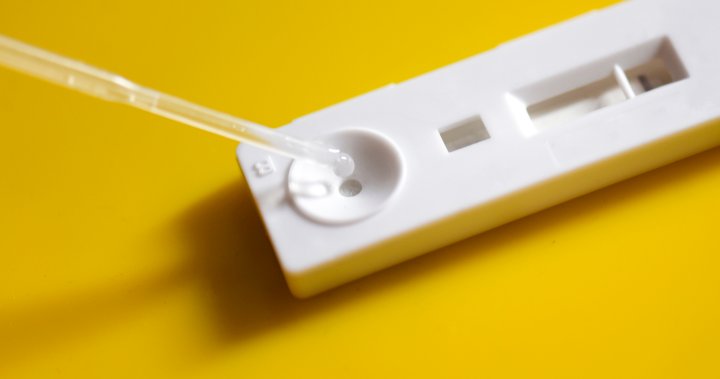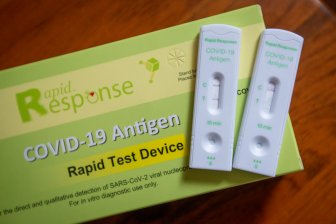With holiday gatherings around the corner and a growing controversy over the importer of millions of COVID-19 rapid tests, Canadians may have questions about how to properly test for the virus at home.
A Global News investigation found the Toronto-area rapid test importer BTNX landed an estimated $2 billion in federal contracts in 2021 and 2022, despite evidence the company gave regulators incomplete data about its product’s accuracy. BTNX has denied the data was incomplete and says it provided regulators with accurate information.
The rapid test is among the more than 30 models of at-home COVID-19 testing devices that have been approved for use by Health Canada to date, and some testing kits remain available free of charge at local pharmacies across the country.

Most of those tests — including all of the latest ones approved for distribution — have between a 90 and 100 per cent sensitivity rating, according to Health Canada approvals, which are a measure of their effectiveness and accuracy.
“As the (regulatory) process was improved there were certainly some improvements (to the tests) since the beginning of the pandemic,” said Dr. David Juncker, a professor and chair of the biomedical engineering department at McGill University.
However, provinces and territories say tests should only be taken when experiencing the symptoms of respiratory disease, or if there has been a known exposure to COVID-19.

In the latter case, the U.S. Centers for Disease Control and Prevention recommend waiting at least five days after exposure before testing.
Get the latest Health IQ news.
Sent to your email, every week.
That’s because it can take three to seven days after infection for there to be enough antigens to be detected by a rapid test, according to the British Columbia Centre for Disease Control. Testing too quickly can result in a false negative.
Even after waiting the recommended amount of time, health officials say false negatives can still occur. If the first test result is negative, take another test between 24 and 48 hours later. The U.S. CDC even recommends taking a third test if a second negative result appears, again up to 48 hours later.
If the test result is positive, follow provincial guidance for isolation. If symptoms develop — even if they’re mild — stay home from work or school. Masks and respirators are recommended for those who develop symptoms to protect loved ones who share the same living space.
Many provinces say at-home tests should only be used if there is no history of previous COVID-19 infection or vaccination.

A year-long investigation into federal procurement revealed that BTNX deleted dozens of specimens, or samples, from a study it submitted to Health Canada. That evaluation showed how well the company’s test detected COVID-19.
The deletions made BTNX’s test appear more reliable and sensitive than it really was, according to researchers Global News consulted.
The device could detect the virus in users who were the most contagious, but results from evaluation programs run by leading regulators indicate BTNX’s test was much less dependable in all other cases.
This apparent flaw meant the test kit was more likely to produce false-negative results which, some experts said, put Canadian lives at risk. Health Canada and the Public Health Agency of Canada bought 404 million tests from BTNX.
BTNX told Global News that it did not offer Health Canada or Canadians inaccurate information about its test.
”We have at all times operated with integrity and transparency, and have manufactured and distributed our COVID-19 rapid tests in accordance with Health Canada and international standards,” BTNX’s lawyer, Richard Dearden of Gowling WLP (Canada), wrote on the company’s behalf.
Dearden denied that BTNX edited information within the study: “BTNX did not make any changes,” he wrote.
In response to Global News’ questions, BTNX described its tests as “a reliable testing tool for Canadians.”
For its part, Health Canada said it found no reason to question the scientific integrity of the studies BTNX submitted.
Prime Minister Justin Trudeau said on Thursday when asked about Global News’ investigation that there are several lessons Canada will need to learn from the pandemic.
“Part of coming through the acute phase of this pandemic is learning about what worked well, what worked less well, making sure that next time, if there is a next time, we are ready for it,” Trudeau said.

Medical experts say while testing can be useful to determine if people need to take extra steps to protect their loved ones from infection, the most important step that can be taken is to get vaccinated.
“My suggestion is to continue to follow provincial guidance on eligibility for testing and get vaccinated for both COVID, flu and if eligible, get the RSV (vaccine) too,” Dr. Larissa Matukas, an associate professor in laboratory medicine and pathobiology at the University of Toronto, told Global News in an email.
“At this point in the pandemic, stay home and/or mask up and get your vaccine. Prevention is the best defence against the spread of the disease.”
Juncker said testing ahead of a holiday gathering is “certainly recommended” as another way to minimize transmission, along with ensuring any space where such gatherings are hosted is properly ventilated.
© 2023 Global News, a division of Corus Entertainment Inc.










